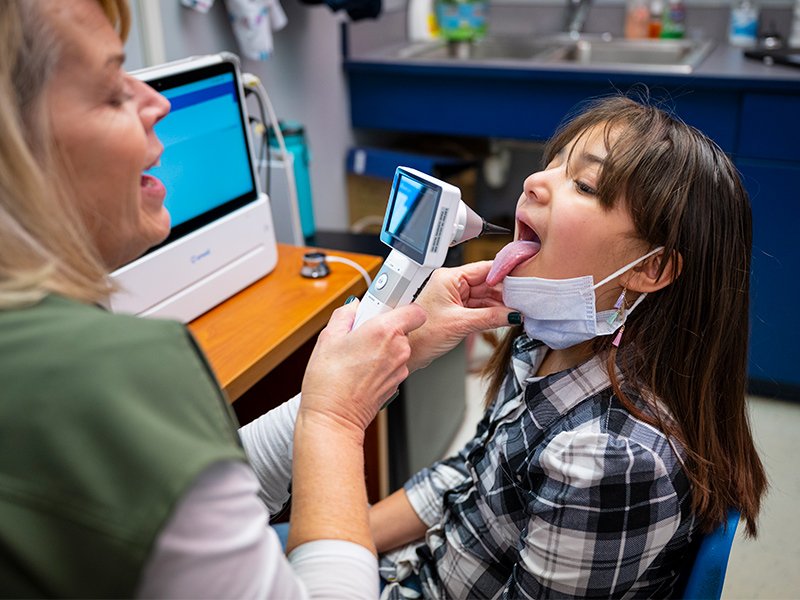Health Care Between Recess and Lunch

Viewing health as an equity issue, Cone Health partners with Guilford County Schools to help improve academic outcomes with an innovative solution: telehealth clinics in each of our 51 Title I elementary schools.
--
Christina Green is in the middle of bathing her elderly mother when she gets a call from her daughter’s school. “Kaleesi is having an asthma attack,” she is told. “We need you to get here as soon as possible.”
Knowing her child is in trouble, Christina is forced to pull her mother out of the tub, set her on the bed and dash out the door, worrying the entire time about both loved ones in unsafe situations.
For a long time, events like these were all too common.
Kaleesi is a fourth-grader who suffers from Hashimoto’s Disease, asthma and chronic migraines, and as a result she often misses classes for rest, doctor’s appointments and medication administration. Since the introduction of school-based telehealth at Bessemer Elementary School, Kaleesi no longer has to leave school early or miss a day entirely.
Telehealth, also known as telemedicine, is a new form of care being rolled out across all 51 Title I schools in the Guilford County system, starting with Bessemer Elementary, Union Hill Elementary, Cone Elementary and Washington Montessori School. The goal is to add 10 more schools for the
2023-24 academic year and then expand to all Title I elementary schools within three to four years.
Acting as an on-site clinic, the telehealth center is equipped with a telepresenter — a trained Certified Medical Assistant (CMA) or Licensed Practical Nurse (LPN) who acts as a bridge between student, provider and parent. The telepresenter has a direct tie to Cone Health doctors, can consult about medications and, when needed, can facilitate a virtual visit with a doctor and a student’s parent. State-of-the-art technology — an electronic stethoscope, for example — allows both doctor and parent to see medical issues up close, despite being miles away.
Both Cone Health and Guilford County Schools (GCS) believe that placing clinics inside schools could have a significant impact on combating learning loss.
“This partnership arose out of listening and understanding what the school system needs. It’s a great opportunity to make a difference in children's lives,” says CEO Mary Jo Cagle.
What Guilford County Schools needs is a solution to students having to leave school and parents leaving work when a child feels ill. In the school-based clinics, telepresenters are authorized to give the student medication. In most cases, students are given the care they need and sent back to class.
Within its first year at Bessemer, the telehealth clinic saw 300 patients — 240 of which were able to return to their classrooms following their visits. The change in process allows for more instruction time, improving educational outcomes overall.
“I absolutely see the difference in our school community,” says Dr. Jonathan Brooks, principal. “Our students are healthier. They attend school more regularly. They have increased confidence.”
Healthy bodies mean healthy minds. That’s the philosophy donors champion when they support school-based telehealth.
Dr. John Jenkins, head of the program at Cone Health, believes the impacts of telehealth run even deeper.
“In the current state, our families are going to the emergency room for routine care. We have analyzed our emergency room use and we see that low severity visits are occurring on a routine basis by these families. And so, you have to ask yourself why.”
The reasons stem from the long hours these parents tend to work. It isn’t until late in the evening that such families have the freedom to seek care, which means they end up in the emergency department at Cone Health.
Patterns like this represent an equity issue, according to Jenkins — one with two sides to the coin, health equity and educational equity. Students attending Title I elementary schools typically do not have access to the same financial, educational or medical resources as other youth, forcing them to miss school often with few safety nets to catch them when they fall behind. The result? The continuation of generational poverty, a long-standing problem in the eastern and southern regions of Guilford County.
Jenkins, a former high school teacher, came up with the idea of placing telehealth clinics in Guilford County’s public schools after seeing that other areas are using this model. Cone Health is making its partnership with GCS unique by leading with Title I elementary schools — a designation indicating that at least 52% of the families in a given school are low-income. Chronic absenteeism — defined as missing 10% of instructional time or more — is common amongst these schools, and can be connected to a host of issues, including low grades and low graduation rates among students as well as increased financial issues as parents are forced to leave work to care for sick children.
Over time, Cone Health’s larger vision is to expand school-based telehealth with even more support options; specifically, mental health access and care options for teachers and staff members. Ultimately, the mission: to make the whole school, and by extension the whole community, healthier.
